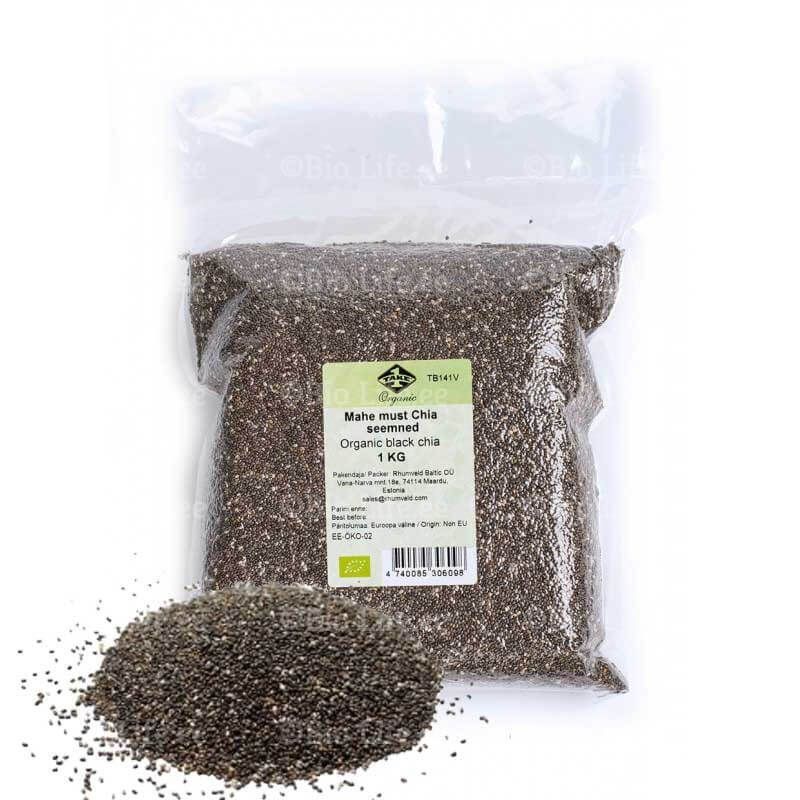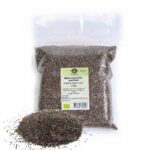Chia seeds 1kg
Expiry date: 25.07.2026
8.50 €
Country of origin: Mexico
Painter: Rhumveld Baltic
3 in stock
Sold By: BioLifeDescription
Chia seeds are one of the most powerful superfoods in the world.
Chia seeds are packed with fibre, which can help you lose weight if you need to, they keep your stomach full and aid digestion.
Another extraordinary property of chia seeds is their ability to bind water, up to 12 times the weight of the seed, to form a calcareous substance. This ability ensures a long-lasting supply of fluids.
So when you add chia seeds to liquid, they immediately absorb the liquid and start to swell. What this means is that chia seeds have a soluble fibre, which is great because soluble fibre takes excess cholesterol out of the body. As cholesterol levels in the body fall, the risk of both heart disease and stroke is reduced.
Reduces blood sugar fluctuations and supports hypoglycaemia and diabetes. Chia soluble fibre has a stabilising effect on blood sugar levels by regulating the digestion and absorption of complex carbohydrates. This creates a steady, stable blood sugar level which also means a steady, high energy level.
Omega 3 fatty acids are essential fatty acids that reduce the risk of heart disease and triglycerides in the blood and increase brain potential. Omega 3 fatty acids are important because our bodies need them to function properly and we cannot produce them naturally. Many different foods provide us with Omega 3 fatty acids, such as salmon, while chia seeds have more Omega 3 fatty acids than salmon.
Two spoonfuls of chia seeds contain the same amount of Omega-3 fatty acids as half a kilo of oily fish.
A lack of Omega 3 fatty acids in the body is linked to depression and mood swings … so if you’re feeling low, eat chia seeds and your mood should improve after a while.
Chia seeds contain 64% omega-3 and 19% omega-6 fatty acids. In comparison, flax seeds have 58% and 15% respectively. Without a doubt, both chia and flax seeds are excellent sources of omega-3.
In addition, Omega 3 fatty acids are beneficial for people with arthritis as they also have anti-inflammatory effects.
Chia’s balanced essential fats (Omega-3 and Omega-6) can significantly boost the brain’s ability to function and improve mood (essential fats are known for their anti-depressant effects). Essential fats make cell membranes much more flexible and allow for much more efficient membrane function, including better nerve impulse transmission and transport of nutrients into cells. A healthy nervous system supports much more efficient brain functioning.
In fact, the essential fats in chia are well known for helping to improve brain function.
Chia seeds have a higher mineral content than flax seeds – they contain 631 milligrams of calcium and 466 mg of magnesium per 100 grams of seeds (flax seeds have 199 mg of calcium and 362 mg of magnesium, respectively).
Eating one tablespoon of chia seeds a day gives you 100 mg of calcium and 70 mg of magnesium, which is quite a considerable amount.
Both chia and flax seeds are rich in fibre and high in protein. Chia seeds contain 20% protein, a much higher percentage than many cereals. Rice, for example, has only 7% protein, while oatmeal has 17%.
Unlike typical cereal proteins, chia protein does not contain gluten. Chia is therefore an ideal food for those with gluten intolerance, carbohydrate intolerance, hypoglycaemia, celiac disease, Krohn’s disease, or those who want to avoid common gluten-containing grains such as maize, barley and wheat. (Moreover, simple carbohydrates-including foods high in gluten-are associated with obesity and high blood sugar instability and generally provide poor nutrient density.) Chia is a gluten-free, nutrient-dense alternative to grain proteins!
They’re also an ideal source of fiber, antioxidants, protein, vitamins, and minerals. For example, they contain more and more easily absorbed calcium per 100g than milk, have three times more iron than spinach and 15 times more magnesium than broccoli.
This product bears the Food and Veterinary Office label: EE-ÖKO-03.
More information (in English): http://en.wikipedia.org/wiki/Salvia_hispanica
Related products
-
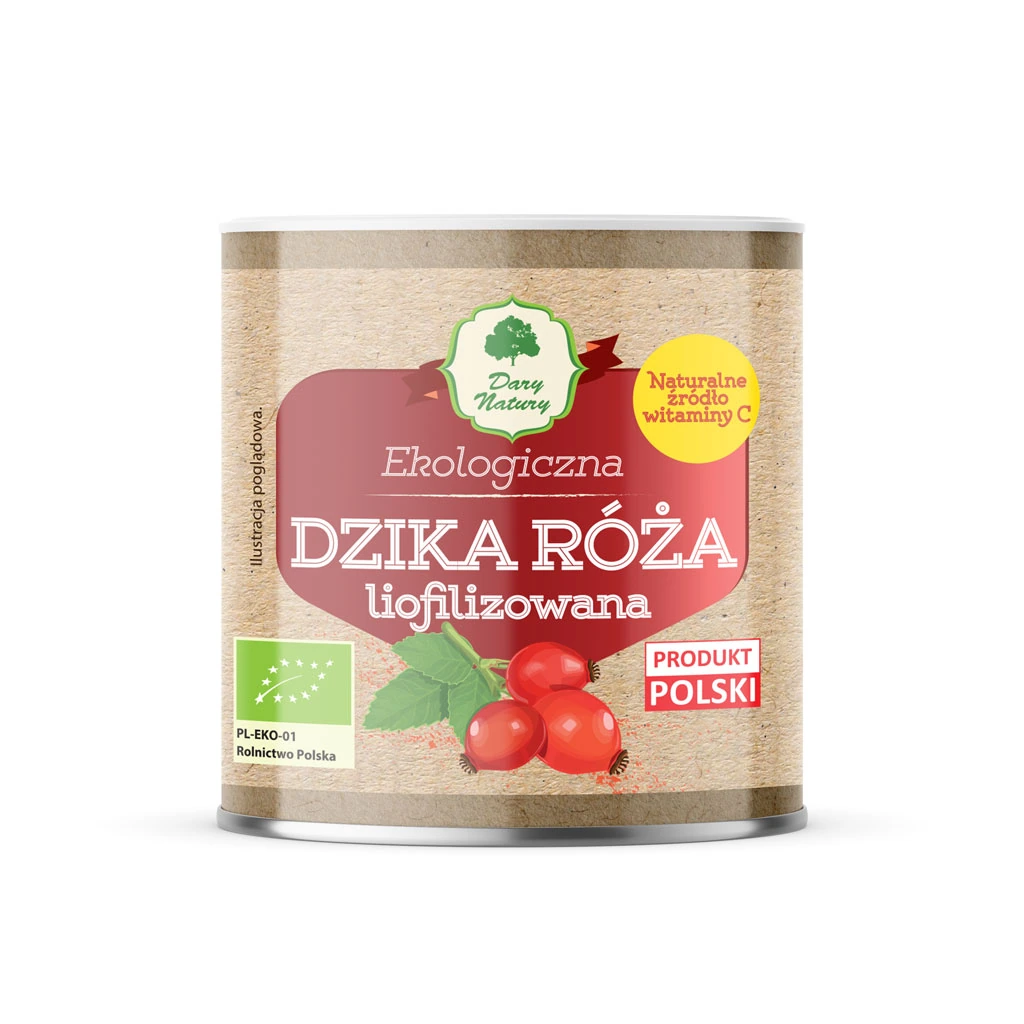
Freeze-dried Rosehip powder 70g BIO
9.30 € Sold By: EluvägiAdd to basket -
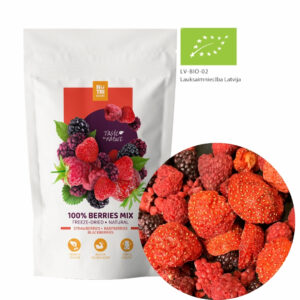
Freeze-dried Strawberry Raspberry Berry 27g
11.55 € Sold By: EluvägiAdd to basket -
Sale!
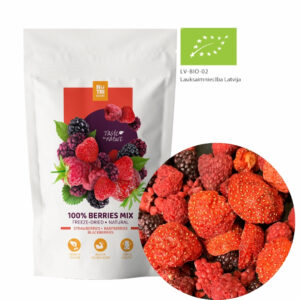
Freeze-dried Raspberries 40g
11.55 €Original price was: 11.55 €.9.90 €Current price is: 9.90 €. Sold By: EluvägiAdd to basket -
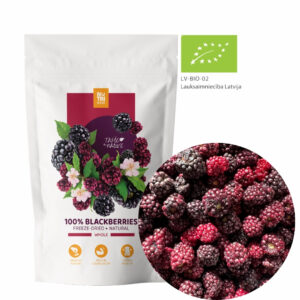
Freeze-dried blackberry 35g
11.55 € Sold By: EluvägiAdd to basket
